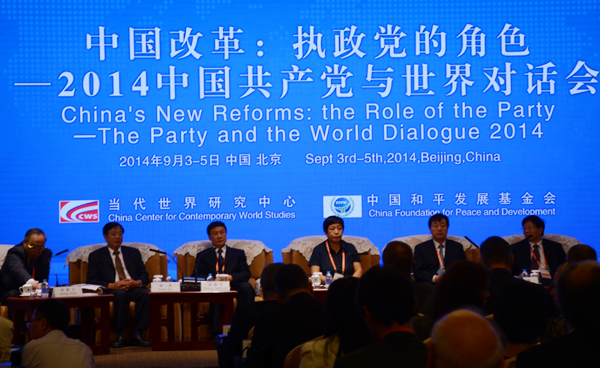'Inclusiveness' next key step in reforms
By Chen Bei (chinadaily.com.cn) Updated: 2014-09-04 17:45
|
 |
| Zhang Yansheng (third from the left), secretary-general of the academic committee at China's National Development and Reform Commission, attends a conference that promotes dialogue between the Chinese Communist Party and the world. [Photo by Chen Bei / chinadaily.com.cn] |
"All-inclusive development" will become a key phrase for the Chinese government in its new round of deepening reforms, a scholar said Wednesday at a top-level conference that promotes dialogue between the Communist Party of China and the world.
|
 China should face perception gap, says scholar |
|
 CPC welcomes direct dialogue with outside world |
The ruling Party is tasked to reduce the Gini coefficient to below 4.5 by 2020, when China achieves its goal of a high-income country, said Zhang Yansheng, secretary-general of the academic committee at China's National Development and Reform Commission.
He made the remarks at a dialogue themed "China's New Reforms: the Role of the Party", which attracted 60 scholars, experts and prominent political figures from more than 30 countries.
In 2013, China's official measurement of the Gini coefficient, a gauge of the wealth gap, was registered at 0.473, higher than the internationally recognized alert level of 0.4. And in some regions, the rating was estimated much higher to reach above 0.6.
Zhang acknowledged relevant reforms of the country's income redistribution have failed to catch up the pace of a rapid economic growth driven by China's economic reform and opening-up policy since 1978. The problem has apparently become an obstacle to the development of a healthier society.
The new reform, outlined at the Party's third Plenary Session of the 18th Central Committee, aims to ultimately help the country's majority benefit more from the world's second-largest economy.
"The role the Party takes in this round of reform is to ensure a fair market and equal opportunities for all the people and businesses," said Zhang, who emphasized the rule of law is the basis for the new reform.
The rule of law is expected to become the theme of the Party's Fourth Plenary Session of the 18th Central Committee that will be held in October.
- Govt encourages people to work 4.5 days a week
- Action to be taken as HIV cases among students rise
- Debate grows over reproductive rights
- Country's first bishop ordained in 3 years
- China builds Tibetan Buddhism academy in Chengdu
- Authorities require reporting of HIV infections at schools
- Typhoon Soudelor kills 14 in East China
- Police crack down on overseas gambling site
- Debate over death penalty for child traffickers goes on
- Beijing to tighten mail security for war anniversary







